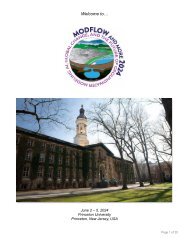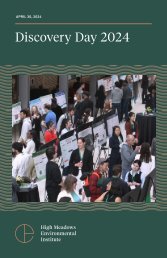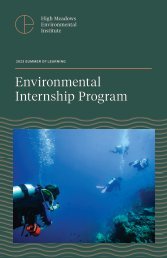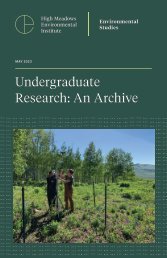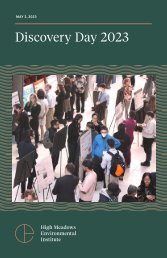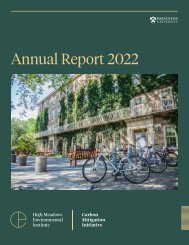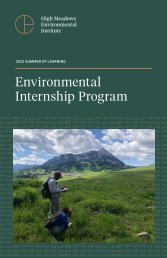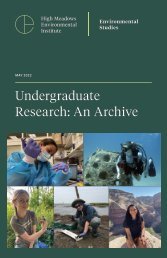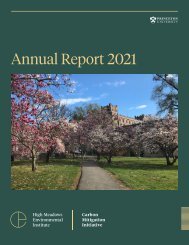Undergraduate Research: An Archive - 2021 Program
You also want an ePaper? Increase the reach of your titles
YUMPU automatically turns print PDFs into web optimized ePapers that Google loves.
Rebecca Mays ’21<br />
CHEMICAL AND BIOLOGICAL ENGINEERING<br />
Certificate in Environmental Studies<br />
THESIS TITLE<br />
Optogenetic Control of<br />
Microbial Consortia for<br />
the Optimization of<br />
Chemical Production<br />
ADVISER<br />
José Avalos, Assistant<br />
Professor of Chemical<br />
and Biological<br />
Engineering and the<br />
<strong>An</strong>dlinger Center for<br />
Energy and the<br />
Environment<br />
Metabolic engineering modifies genetic<br />
pathways in microbes to more efficiently produce<br />
chemical compounds. However, engineered<br />
pathways induce metabolic burden within<br />
microbes. Microbial consortia divide metabolic<br />
labor among several microbial strains but<br />
require control systems to ensure microbes<br />
in consortia operate at ratios to maximize<br />
production. My research built on previous work<br />
that tuned microbial growth using blue lightactivated<br />
genetic circuits. Optogenetic control<br />
provided dynamic control over consortia of<br />
Saccharomyces cerevisiae and optogenetically<br />
controlled Escherichia coli, which produced<br />
isobutyl acetate — a valuable industrial chemical<br />
— and naringenin, a valuable pharmaceutical<br />
compound. We then explored media containing<br />
lignin-derived acids with naringenin-producing<br />
S. cerevisiae. Lignin is a waste byproduct of many<br />
chemical processes, the valorization of which<br />
has economic and environmental implications.<br />
We characterized the toxicity of several<br />
acids to S. cerevisiae before examining the<br />
detoxifying effects of optogenetically controlled<br />
Pseudomonas putida in consortia with S.<br />
cerevisiae. This research demonstrated the more<br />
sustainable production of valuable chemical<br />
compounds.<br />
ENVIRONMENTAL<br />
ENGINEERING<br />
26




